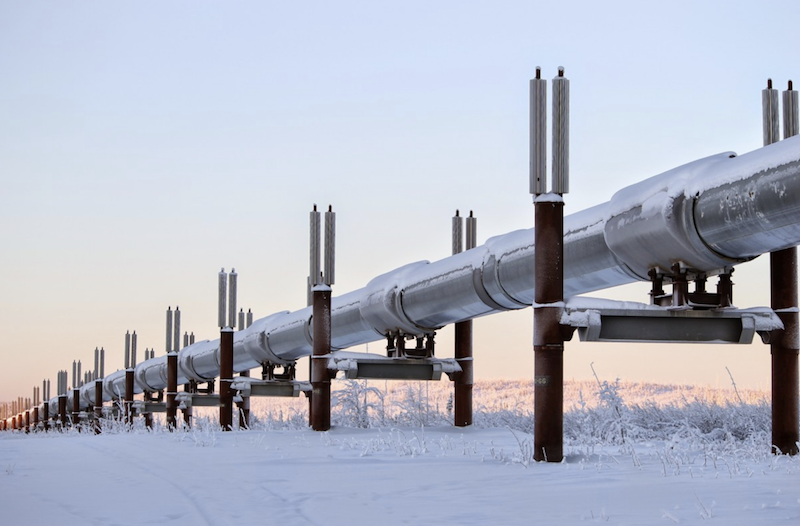
Can gas ever be renewable? "Renewable" natural gas is predominantly methane, just like the gas we already use for home heating and cooking. And it would still be piped through leaky gas pipelines—meaning no end to climate damaging (and explosive) methane gas leaks.
Recently, a surprising voice has joined the chorus of those calling for clean, renewable alternatives to climate-damaging oil and gas. This voice comes from the fossil fuel industry. But what they’re calling for – “renewable” natural gas – is just another ploy so they can continue business-as-usual for the sake of their polluting profits.
The truth is “renewable” natural gas is not renewable or natural – and it is certainly not a large-scale clean energy climate solution. Instead, “renewable” natural gas is a shameless attempt by the fossil fuel industry to maintain the status quo in New England, keeping us shackled to polluting fuels and their dangerous infrastructure.
“Renewable” Natural Gas Will Not Help Us Reach Our Climate Goals
Fossil fuel companies want to sell us so-called “renewable” natural gas for the same things we use natural gas for now, like heating and cooking. Also known as “biomethane,” “renewable” natural gas is made from manure, industrial food waste, landfill gas, wood, and more. It’s a highly processed gas that still contains at least 90% methane – a greenhouse gas that damages the climate significantly more than carbon dioxide.
So, the term “renewable” natural gas is just a cover for what this fuel really is: methane, just like regular natural gas. Which makes the industry’s claims that it is a clean energy solution for our overheating planet wrong and misleading.
“Renewable” Natural Gas Endangers Public Health
Buying into the gas industry’s greenwashing by boosting the production of “renewable” natural gas would hurt our climate and our health. When burned, “renewable” natural gas releases nitrous oxide, a pollutant that creates smog and lowers air quality. These toxins can cause respiratory illnesses, like asthma. And for those already living with respiratory issues, such pollution makes them worse.
Moreover, low-income communities and communities of color would experience the worst impacts of this pollution. These communities are already more likely to have industrial facilities and highways cutting through them, with both spewing harmful toxins into homes and businesses. The facilities that make “renewable” natural gas are often located in these communities, too. Those facilities release toxic pollution in the process of creating the fuel, which means its creation and use would overburden those already most vulnerable to industrial pollution and its harms.
To top off the health effects, studies have shown that gas appliances – like gas stoves and ovens – cause indoor air quality problems that can increase the risk of respiratory diseases, especially in children. Rather than simply replace one bad gas product with another, we would all be better off if we moved away from methane gas entirely.
We Have Better Ways to Deal with Emissions from Landfills, Food Waste, and Farms
The gas industry and its allies justify their unrealistic plans to for “renewable” natural gas by suggesting they are just channeling other sources of polluting emissions into a usable product. They aren’t entirely wrong – there could be small-scale, localized uses for the methane gas produced by agriculture or landfills. But we could never produce enough of it to replace the methane gas in all residential or commercial heating systems. And it would still be piped through gas companies’ already leaky pipelines—meaning no end to their climate-damaging (and explosive) methane leaks.
The bigger picture is that investing in “renewable” natural gas will not lead to a significant drop in climate-damaging emissions. Instead, it will incentivize producing even more of the polluting wastes needed to make this gas. And that would worsen the harm our trash and agriculture systems already impose on people and the environment.
Rather than turning the polluting emissions from landfills and agriculture into energy, we should work to reduce them altogether. That means adopting zero waste practices to slash the trash sent to landfills. It means introducing more industrial-scale composting programs, like those already taking root in some states. And it means helping our farmers cultivate crops in ways that help our climate and create healthier soils.
The Answer to Our Energy Needs Is Real Clean Energy, Not “Renewable” Natural Gas
The fossil fuel industry desperately wants us to invest in their dirty products and infrastructure. “Renewable” natural gas is just their latest attempt to stuff their wallets while we suffer the fallout from our changing climate.
But we know the truth.
Despite the fossil fuel industry’s rhetoric, the reality is that electricity made from solar and wind power is cheaper and cleaner than any kind of gas. Investing in more gas rather than in true clean energy sources is a waste.
Using real renewable energy and electrifying everything – from our heating to our cars – are more affordable, safer options for New England and our climate.



